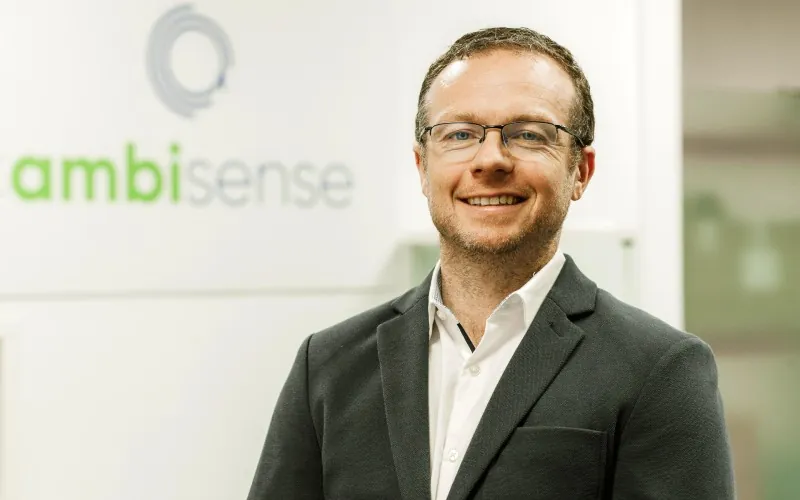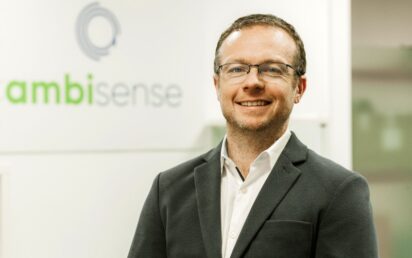The climate emergency and rise in extreme weather events has moved environmental considerations towards the top of the business agenda.
From ESG credentials to protecting assets, businesses are becoming more aware of the need to take action.
“It hasn’t changed how we operate or approach our business at all – but it is now a huge driver of growth,” Stephen McNulty, CEO of Ambisense, tells BusinessCloud.
“Growth rates for our industry have doubled in the past two years. Our customers are now driven to demonstrate their ESG credentials to a broad set of stakeholders and they need data and intelligent systems to achieve this.
“We build those systems and they have never been in more demand.”
Founded in Dublin in 2014, Ambisense is an Internet of Things and artificial intelligence analytics business focused on monitoring environmental risks.
“At the time we started, technology was perceived to be a real threat to established business models – and still is, in some instances – but we felt confident that as technology improved and market demands changed, those barriers would fall and the industry would embrace digitalisation, just as practically every other industry has and is doing,” says McNulty.
“Rather incredibly, our sector is still over-reliant on people manually collecting and analysing data. These processes are manpower heavy, expensive and inefficient. Our business model is to automate both of these processes and deliver actionable intelligence for our customers.
“We launched initially into the brownfield remediation market with the Gasflux, the first continuous ground gas monitoring sensor. At the time – and still somewhat to this day – site data was manually collected whereas Gasflux automated that data collection and sent it to a platform, allowing remote monitoring.”
‘David Attenborough’s Blue Planet convinced me I had to join the fight to save the world’
COVID-19 impact
The arrival of COVID-19 sent the business in an unexpected direction. “The pandemic created a huge focus on indoor air quality. We found our product stack and commercial opportunities suddenly pulled in a direction not obvious to us 12 months before,” explains McNulty.
Ambisense’s products are now used to analyse environments in places such as offices, schools, factories and hospitality venues, as well as major infrastructure projects including the multi-billion-pound Lower Thames Crossing.
Its tech integrates multi-parameter environmental data with contextual data such as weather to give a comprehensive view of a location in the past, the present, and in the likely future.
AmbiAir, for example, combines connected hardware with intelligent software that not only automates the analysis of data, but also uses complex algorithms to predict indoor air quality and identify potential unsafe hotspots, alerting users minutes, or even hours in advance.
“The solution calculates ventilation levels and COVID-19 risk by monitoring CO2, temperature, and humidity, with early, predictive notification allowing users to take a proactive, low-cost, risk management approach such as opening windows or automatically adjusting HVAC before a space becomes an unsafe environment,” says McNulty.
“Critically, building owners and managers can use this data-first approach to assess whether expensive remediation works are actually required to improve building air quality and reduce COVID risk.
“We are currently working with a large UK financial institution to monitor the air quality across their estate and with an Irish university, NCIRL, to monitor the air quality across their campus as they work to bring students and faculty back safely.”
Ambisense has secured a total of €5.1 million in funding over three rounds since 2018. The latest round was led by BGF and supported by existing investors including Sure Valley, Atlantic Bridge and Enterprise Ireland.
UK growth plans
Having opened a UK base in 2017, there are plans to scale here. “We currently employ eight people in the UK across operations and sales in Brighton, Chester and Rainham,” says McNulty.
“Over the next 12-24 months our growth rate will see us hiring extensively in the UK across all disciplines. Our strategy is to provide localised services to customers and we can only achieve this through hiring and retaining great people.
“We work with pretty much all the major players in our market and our growth plans are to deepen the relationship with those customers by continuing to innovate and develop game-changing products.”


